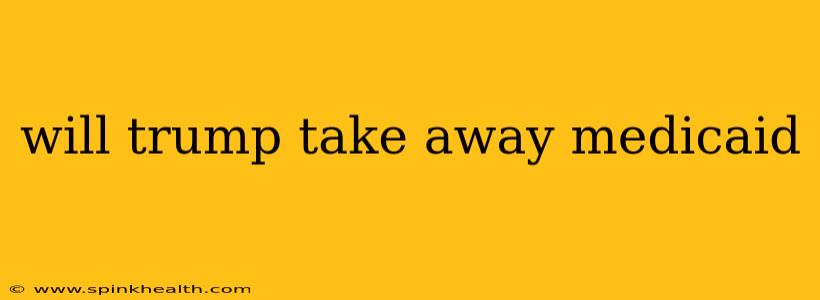Will Trump Take Away Medicaid? Unpacking the Complexities of Healthcare Reform
The question of whether Donald Trump would "take away Medicaid" is far more nuanced than a simple yes or no answer. His administration's policies towards Medicaid were complex, involving attempts at significant restructuring rather than outright elimination. Let's delve into the specifics, exploring the various proposals and their ultimate impact.
The story begins with Trump's campaign promises. While he didn't explicitly call for outright abolishing Medicaid, he advocated for significant changes to the system. His proposals aimed to shift the program's structure, potentially impacting its accessibility and coverage for millions. This generated considerable uncertainty and anxiety among beneficiaries and healthcare providers alike.
What were Trump's proposed changes to Medicaid?
Trump's approach to Medicaid centered around converting it into a block grant system. This would involve allocating a fixed sum of money to each state, rather than the current open-ended federal matching system. The argument was that this would give states more control over how they manage their Medicaid programs and encourage greater efficiency.
However, critics argued that a block grant system could lead to cuts in benefits and reduced access to care, particularly for vulnerable populations. The fixed funding could prove insufficient to meet the increasing healthcare needs of a growing and aging population, potentially resulting in reduced coverage, higher premiums, or stricter eligibility requirements. The potential consequences fueled widespread concerns and protests.
What happened to these proposals?
While the Trump administration made several attempts to reform Medicaid through regulatory changes and budget proposals, Congress ultimately blocked many of the most sweeping changes. The efforts to convert Medicaid to a block grant system never gained enough traction to become law. This meant that the program remained largely intact throughout his presidency, though ongoing negotiations and debates continued.
Did Trump's administration make any changes to Medicaid?
While significant restructuring efforts failed, the Trump administration did implement certain changes. These included efforts to tighten eligibility requirements in some states and increased pressure on states to pursue work requirements for Medicaid recipients. The impact of these measures varied by state and continues to be a topic of ongoing debate and research.
What are the long-term implications of these policies?
The long-term implications of the Trump administration's approach to Medicaid are still unfolding. The attempts at reform highlighted the deep partisan divisions surrounding healthcare policy in the United States. While outright elimination wasn't achieved, the proposed changes and implemented measures created significant uncertainty and potentially affected access to care for some individuals. The legacy of these policies will likely be felt for years to come as states grapple with the ongoing challenges of providing affordable and accessible healthcare to their residents.
How did Trump's Medicaid policies affect different groups of people?
The impact of Trump's proposed and implemented policies varied significantly across different populations. Low-income individuals, people with disabilities, and elderly individuals reliant on Medicaid were particularly concerned about potential reductions in coverage or access to necessary healthcare services. The effects of these policies continue to be studied and debated by healthcare researchers and policymakers.
In conclusion, while Donald Trump didn't "take away" Medicaid in the literal sense, his administration's policies aimed to significantly reshape the program. The ultimate impact is complex and multifaceted, with ongoing debate and analysis continuing to unfold. Understanding the details of these policies is crucial to fully grasping the current state of healthcare access in the United States.

